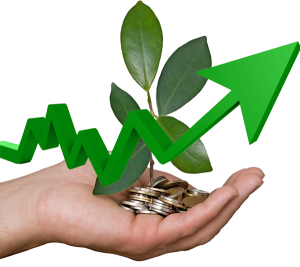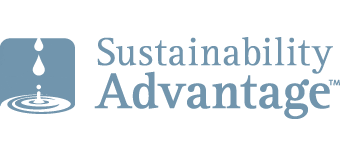Sustainability Business Case # 3: Share Price

In previous posts, I identified three ways to frame the business case for sustainability: improved profit; high return on investment (ROI); and higher share price/market valuation. I’ve already illustrated that the profit-based business case and the ROI-based business cases are very strong.
Now let’s discuss that final rung: whether a case can be made that sustainability initiatives will have a positive effect on market value/share price.
Executives of publicly traded companies are very interested in share price. They are accountable to shareholders who demand ever-increasing market value and need to convince financial analysts that their return on assets (ROA) and return on equity (ROE) are superior to others in their sector.
At a personal level, they may own considerable shares themselves, and/or their remuneration may include stock or stock options, so they have a personal stake in higher share prices. It would be nice if we could reassure them that sustainability initiatives lead to higher stock valuations. But can we?
Can Sustainability Lead to Higher Stock Prices?
Let’s start with a slightly different question: If a company does not implement sustainability programs, do investors lose out?
The Domini 400 Social Index, Dow Jones Sustainability Index, Sustainalytics’ Jantzi Social Index (JSI), and the Financial Times (London) Stock Exchange Index all track companies rated as sustainability leaders. These indices perform as well as, or slightly better than, indices for the rest of the market. Sustainability leaders do not seem to sacrifice financial market value for their efforts, nor are others missing market gains.

On a more positive side, academic researchers have conducted several meta-analyses and have found a small positive correlation between sustainability performance and financial results like return on assets (ROA), return on equity (ROE), and stock market performance. The studies find little evidence of a financial downside of having good or bad sustainability performance.
Does It Pay to Be Good?
For example, “Does it pay to be good?” a 2007 meta-analysis of 167 independent studies on the relationship between corporate spending on corporate social performance and financial performance in the market, found that 27 percent of the studies showed a positive relationship; two percent showed there was a negative relationship; and the rest found no significant relationship.
Valuing Sustainability in 2008…
More optimistically, in 2008 the Network for Business Sustainability commissioned Dr. John Peloza and Ron Yachnin to do a systematic review of thousands of studies from both academia and the corporate world on valuing sustainability. The two analyzed 159 studies and meta-studies published since 1972 and found that 63 percent showed a positive relationship between sustainability, which they call corporate social performance (CSP), and stock market performance, which they call corporate financial performance (CFP); only 15 percent of past studies showed a negative relationship.
As the authors admit though, methodological limitations of past research — such as over-reliance on old data, inconsistent definitions, sampling problems, concerns about the reliability and validity of the CSP and CFP measures, lack of opportunities to test mediating mechanisms, and a need for a causal theory to link CSP and CFP — could result in either understatement or overstatement of findings. Further research is needed, using more current data.
…to the Eccles Study in 2012
More recently, the “Eccles study” was released in March 2012. The Impact of a Corporate Culture of Sustainability on Corporate Behavior and Performance, authored jointly by Robert G. Eccles, Ioannis Ioannou, and George Serafeim, analyzed a matched sample of 180 “High Sustainability” companies and “Low Sustainability” companies over an 18-year period.
They found that the High Sustainability group outperformed the Low Sustainability group by 4.8 percent on a value-weighted base. The outperformance is stronger in sectors where the customers are individual consumers, where companies compete on the basis of brands and reputation, and where companies’ products significantly depend upon extracting large amounts of natural resources.
Further, the narrower the time frame and the tighter the subset of companies studied, the more impressive the results. Companies with the best ESG performance in four sectors, (energy, mining & steel, media, and food & beverages) as selected for Goldman Sachs’ GS SUSTAIN list, outperformed the average MSCI World Index by 25 percent between August 2005 and June 2007.
Sustainability & Stock Value: Correlation Remains Inconclusive
The big question is: Is improved stock market performance because of sustainability initiatives, or is it just a happy correlation?
We want to believe the connection is as direct as the energy savings to profit improvement connection, but this attribution is difficult to nail down. Unfortunately, academic research and the performance of sustainability indices do not provide compelling quantitative support for a stock price benefit for good CSP, nor a risk of a CFP-downside for companies not embracing sustainability strategies.
Keeping the Iceberg of Value Afloat
However, more and more of a company’s market value is below the water line in its iceberg of value. As shown opposite, in the last 30 years intangibles/non-financials/reputation have grown from just 5 percent of the iceberg of value in 1978 to 80 percent in 2010.Expectations of higher and higher price/earnings (P/E) ratios reflect this trend. The increased weight of reputation/goodwill/brand image in sizing market capitalization is legitimizing sustainability factors as valuation drivers.
Plus, financial analysts are beginning to view corporate attention to sustainability as a proxy for good governance in their assessment of intangibles.
The writing is on the wall that sustainability-related reputation and governance factors will increasingly impact market value.
So, of the three frameworks for the business case for sustainability, the one framed around potential profit improvements is the strongest; the ROI-based one is a close second, and the one that claims improvements in stock price is a distant third … so far.
Bob





Comments are closed.